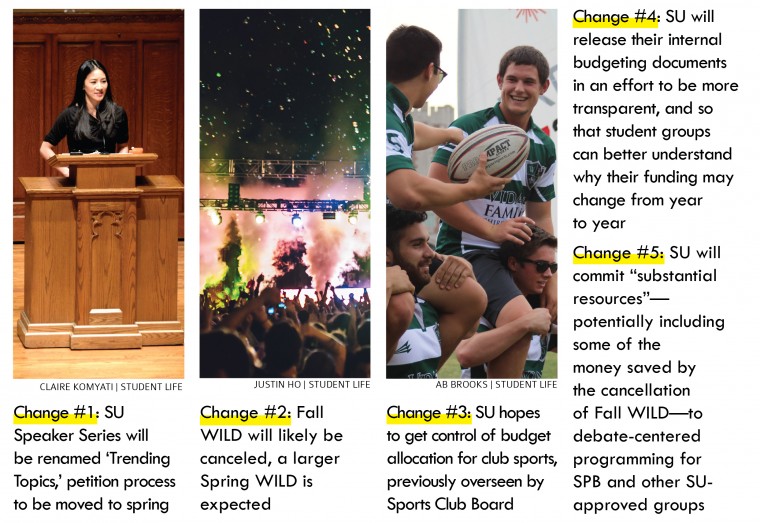News
Fall WILD likely canceled due to debate logistics
SU to introduce other budget changes
Fall WILD will likely not occur this year due to scheduling and budgeting constraints imposed by the October presidential debate, Student Union executive members told Student Life in an interview Sunday night.
This is just one of the changes impacting SU’s budget process this semester. Other budgeting decisions will include an overhaul of the current Speaker Series—to be renamed Trending Topics—and soon-to-be acquired control of budgeting for club sports. Additionally, Student Union will release internal budgeting documents at a meeting for club presidents and treasurers this coming Saturday to increase transparency.
 Noa Yadidi | Student Life
Noa Yadidi | Student Life Social Programming Board, which usually puts on two WILD concerts every year, is looking forward to hosting a larger-than-usual WILD in the spring of 2017—hopefully helped by some of the funds that would’ve been used to plan this year’s fall WILD, according to a press release it released Sunday night.
SU President, senior Jordan Finkelstein, echoed SPB, expecting the anticipated budget for fall WILD to be poured into the budget for spring WILD talent—“which means that’s going to be a huge, big-name performer.”
SPB will be able to more accurately gauge the magnitude of such a WILD following budget approval in late February.
As for the coming fall semester, Finkelstein said that SU will commit “substantial resources”—potentially including some of the money saved by the cancellation of fall WILD—to debate-centered programming for SPB and other SU-approved groups.
“I think our friends in Social Programming Board are excited about the opportunity to think about a large-scale program around the debate,” Finkelstein said. “It’s asking a lot…[of] our campus partners who are going to be stretched thin working on this debate to also help us with fall WILD, and I think that, looking at the calendar, it doesn’t make it easy to pick a date like it usually is.”
Furthermore, to allow for more political speakers surrounding the debate, SU is revamping their Speaker Series and moving up the petitioning process for speakers from fall to this spring. SU also plans to have more control over communication with speakers and assist student groups in planning speaker events.
Finkelstein said that he hoped increased SU involvement would allow Treasury representatives to focus on the merit of potential speakers, rather than whether the sponsoring group could organize a Speaker Series event.
SU hopes that its increased role in communicating with speakers will also help to prevent speaker cancellations.
SU also hopes to acquire control of budget allocation for club sports, which has previously been overseen by Sports Club Board. SU’s Vice President of Finance, junior Kenneth Sng, said that having a separate allocation process tends to result in inequitable treatment.
“We’ve done some research and found out that sports clubs in general get around 60 percent of their approved funding…for the past few semesters, all student groups on campus minus sports clubs have been receiving around 99.9 percent funding,” Sng said. “So we thought that this is one instance where inequitable treatment might arise and that might be the reason why sports club members have to pay such high dues.”
Finally, Student Union will release their internal budgeting documents on Saturday in an effort to be more transparent and so that students groups can better understand why their allocated funding might change from year to year.
Additional reporting by Rachel Katzin.
